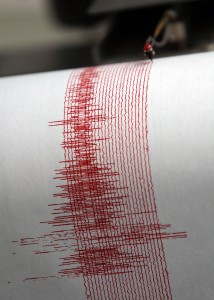UPDATED: Four Earthquakes Rattled Texas Last Week, Another on Sunday

Photo: OLIVER BERG DPA/LANDOV
Regulators are trying to craft rules to respond to the dramatic uptick in quakes.
It was a shaky week in Texas last week with three small earthquakes rattling the Dallas-Fort Worth area and a slightly more powerful quake detected in South Texas.
The first quake measuring magnitude 2.4 struck near Arlington. It prompted some residents to call 9-11 after feeling their houses shake and hearing “explosions,” according to the the Forth Worth Star Telegram.
Earthquakes are often accompanied by loud “booms,” something that has become a source of anxiety in newly quake-prone parts of the state.
The quake coincided with a water main break that morning that left about a dozen homes without water. The City of Arlington tells StateImpact Texas that the water main break was not caused by the earthquake.
On Thursday, a second quake hit North Texas this one measuring 2.9. It was centered near an elementary school in Irving.
The South Texas quake was the strongest of the three. It measured 3.2 and was centered about two miles southeast of Charlotte. It struck on Wednesday, but was not reported by the USGS until Thursday.
A fourth quake again rattled Arlington on Friday evening, it measured 2.5.
All of the quakes happened in parts of the state with extensive oil and gas drilling activity.
While it takes comprehensive geological study to definitively link quakes to man made activity, Texas has seen a major increase in quakes since the current oil and gas drilling boom began. For example, the Dallas-Fort Worth region recorded virtually no quakes until 2008, around the time the fracking boom ramped up in the area. Numerous studies have linked drilling activity with quakes.
Geologists believe many of those quakes are caused by waste water disposal wells where liquid waste from drilling is pumped back underground. Others may be caused by enhanced oil recovery techniques or even the process of fracking itself.
The Railroad Commission of Texas, which regulates oil and gas in the state, is considering new rules for disposal wells that may guard against quakes. That process was initiated after a spate of quakes near the North Texas town of Azle captured public attention.
UPDATE: Another earthquake was detected on Sunday 9/14 in West Texas near Snyder. A study by Wei Gan of the China University of Geosciences and Frochlich found that the injection of carbon dioxide to enhance oil recovery in the Cogdell oil field of West Texas (north of Snyder) were likely responsible for a string of earthquakes there, including a 4.4 magnitude quake in September 2011.
NOTE: This post was updated from the original version to include the City of Arlington’s response to questions regarding the water main break.

